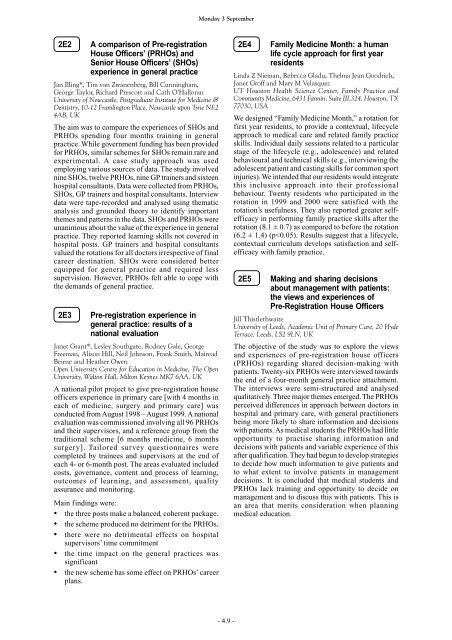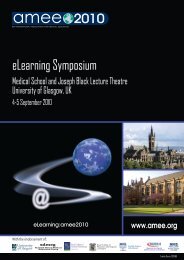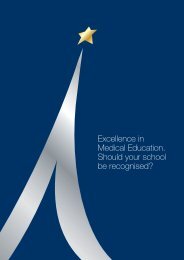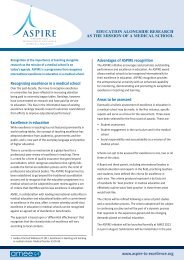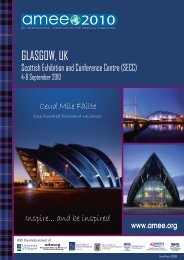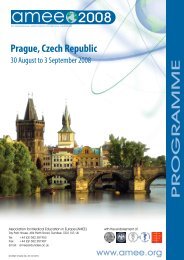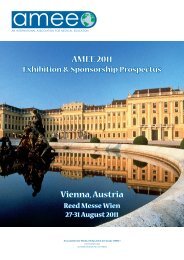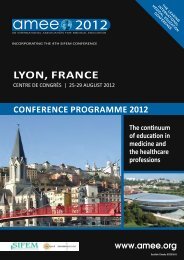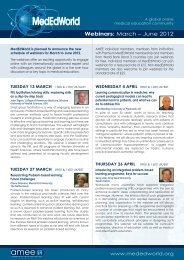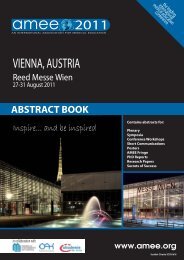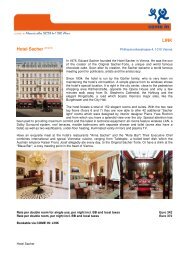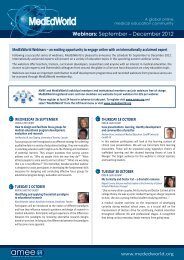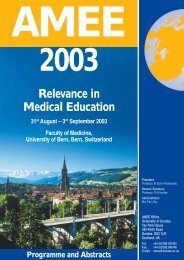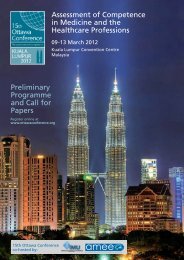AMEE Berlin 2002 Programme
AMEE Berlin 2002 Programme
AMEE Berlin 2002 Programme
Create successful ePaper yourself
Turn your PDF publications into a flip-book with our unique Google optimized e-Paper software.
2E2 A comparison of Pre-registration<br />
House Officers’ (PRHOs) and<br />
Senior House Officers’ (SHOs)<br />
experience in general practice<br />
Jan Illing*, Tim van Zwanenberg, Bill Cunningham,<br />
George Taylor, Richard Prescott and Cath O’Halloran<br />
University of Newcastle, Postgraduate Institute for Medicine &<br />
Dentistry, 10-12 Framlington Place, Newcastle upon Tyne NE2<br />
4AB, UK<br />
The aim was to compare the experiences of SHOs and<br />
PRHOs spending four months training in general<br />
practice. While government funding has been provided<br />
for PRHOs, similar schemes for SHOs remain rare and<br />
experimental. A case study approach was used<br />
employing various sources of data. The study involved<br />
nine SHOs, twelve PRHOs, nine GP trainers and sixteen<br />
hospital consultants. Data were collected from PRHOs,<br />
SHOs, GP trainers and hospital consultants. Interview<br />
data were tape-recorded and analysed using thematic<br />
analysis and grounded theory to identify important<br />
themes and patterns in the data. SHOs and PRHOs were<br />
unanimous about the value of the experience in general<br />
practice. They reported learning skills not covered in<br />
hospital posts. GP trainers and hospital consultants<br />
valued the rotations for all doctors irrespective of final<br />
career destination. SHOs were considered better<br />
equipped for general practice and required less<br />
supervision. However, PRHOs felt able to cope with<br />
the demands of general practice.<br />
2E3 Pre-registration experience in<br />
general practice: results of a<br />
national evaluation<br />
Janet Grant*, Lesley Southgate, Rodney Gale, George<br />
Freeman, Alison Hill, Neil Johnson, Frank Smith, Mairead<br />
Beirne and Heather Owen<br />
Open University Centre for Education in Medicine, The Open<br />
University, Walton Hall, Milton Keynes MK7 6AA, UK<br />
A national pilot project to give pre-registration house<br />
officers experience in primary care [with 4 months in<br />
each of medicine, surgery and primary care] was<br />
conducted from August 1998 – August 1999. A national<br />
evaluation was commissioned involving all 96 PRHOs<br />
and their supervisors, and a reference group from the<br />
traditional scheme [6 months medicine, 6 months<br />
surgery]. Tailored survey questionnaires were<br />
completed by trainees and supervisors at the end of<br />
each 4- or 6-month post. The areas evaluated included<br />
costs, governance, content and process of learning,<br />
outcomes of learning, and assessment, quality<br />
assurance and monitoring.<br />
Main findings were:<br />
• the three posts make a balanced, coherent package.<br />
• the scheme produced no detriment for the PRHOs.<br />
• there were no detrimental effects on hospital<br />
supervisors’ time commitment<br />
• the time impact on the general practices was<br />
significant<br />
• the new scheme has some effect on PRHOs’ career<br />
plans.<br />
Monday 3 September<br />
- 4.9 -<br />
2E4 Family Medicine Month: a human<br />
life cycle approach for first year<br />
residents<br />
Linda Z Nieman, Rebecca Gladu, Thelma Jean Goodrich,<br />
Janet Groff and Mary M Velasquez<br />
UT Houston Health Science Center, Family Practice and<br />
Community Medicine, 6431 Fannin, Suite JJL324, Houston, TX<br />
77030, USA<br />
We designed “Family Medicine Month,” a rotation for<br />
first year residents, to provide a contextual, lifecycle<br />
approach to medical care and related family practice<br />
skills. Individual daily sessions related to a particular<br />
stage of the lifecycle (e.g., adolescence) and related<br />
behavioural and technical skills (e.g., interviewing the<br />
adolescent patient and casting skills for common sport<br />
injuries). We intended that our residents would integrate<br />
this inclusive approach into their professional<br />
behaviour. Twenty residents who participated in the<br />
rotation in 1999 and 2000 were satisfied with the<br />
rotation’s usefulness. They also reported greater selfefficacy<br />
in performing family practice skills after the<br />
rotation (8.1 ± 0.7) as compared to before the rotation<br />
(6.2 ± 1.4) (p


